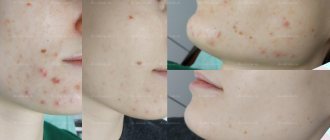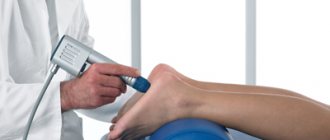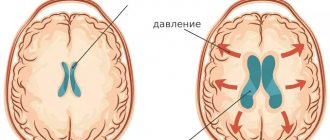From this article you will learn:
- what is isotretinoin,
- Acnecutane and Roaccutane - instructions, reviews,
- differences between these drugs.
Isotretinoin is a retinoid that is also known as 13-cis-retinoic acid (Figure 1). This chemical compound is an isomer of tretinoin (trans-retinoic acid), which, like isotretinoin, is a structural analogue of vitamin A. Isotretinoin is best known as an oral systemic retinoid that is used to treat severe forms of acne. The latter include, for example, nodular and conglobate forms of acne, as well as forms of acne that are resistant even to oral antibiotics.
Systemic retinoids containing isotretinoin include drugs such as Acnecutane and Roaccutane. As we said above, they are intended for oral administration (available in capsule form). However, there are preparations with isotretinoin for external use that can be used to treat photoaging of facial skin. These drugs include those available on the Russian market - Retasol drugs, as well as retinoic ointment.
Isotretinoin (13-cis-retinoic acid) –
Reviews from dermatologists about Acnecutane and Roaccutane are the most positive, because in fact, these drugs with isotretinoin have made a real revolution in the treatment of severe forms of acne. They have improved the quality of life for many patients, including preventing the formation of scars. Isotretinoin therapy provides complete remission of the disease in almost all patients with acne, and after completion of the course of therapy, remission can last up to several months or even years.
However, therapy with systemic retinoids is associated with the risk of quite severe side effects, which we will discuss in detail below (they occur especially often if the dosage is incorrectly selected). Girls and women should take into account that these drugs have a pronounced teratogenic effect, and therefore they are prohibited both during pregnancy and breastfeeding. In addition, the entire period of use of the drug will require a two-level contraceptive system (both oral contraceptives and condoms).
How much do Roaccutane and Acnecutane cost in pharmacies -
For 2021, the price for Roaccutane will be from 1900 rubles - for a package of 30 capsules of 10 mg. It should be noted that this drug can now not be purchased in every pharmacy, which is apparently due to the current re-registration of the drug on the Russian market. For Acnekutan, the price for a package of 30 capsules of 8 mg will be from 1650 rubles, and for a package of 30 capsules of 16 mg - from 2600 rubles.
Analogs of Roaccutane include such drugs as Sotret (India) and Verocutan (Russia). The first one costs from 1350 rubles per pack of 30 capsules of 10 mg. As for the Russian drug Verokutan, it has currently disappeared from sale.
What is isotretinoin
Isotretinoin is an organic chemical compound and a synthetic derivative of vitamin A, which is a stereoisomer of all-trans retinoic acid (tretinoin). It is a potent substance used primarily in the treatment of all types of acne, including nodular cystic acne and pimples.
In particular, isotretinoin is used to combat severe forms of the disease that are resistant to standard treatments. The effect of the drug is to stop the growth of the sebaceous glands and reduce their activity. In small doses, dermatologists successfully treat other skin diseases with it - seborrhea, seborrheic dermatitis and rosacea. Retinoids also provide excellent results in anti-aging treatments.
Clinical studies have shown that this substance is very effective in treating acne. It is ideal for cases where antibiotics or other topical medications do not help. It has also been found that in addition to reducing the activity of the sebaceous glands of the skin (up to 80%), isotretinoin causes a reduction in their size by 35-58%, stimulates the renewal of epidermal cells and reduces their keratinization. The drug also has an anti-inflammatory effect.
People struggling with severe acne write rave reviews about the results of using the drug on online forums. Spectacular photographs taken before and after treatment are posted on social networks. The prospect of getting rid of annoying defects that significantly spoil your mood is tempting. However, before considering such treatment, it is worth learning more about it.
Why does acne occur?
The content of the article
Acne is a group of diseases associated with disorders of the sebaceous glands. The most popular form of acne appears to be acne vulgaris, which usually affects teenagers and some adults. As a result of hormonal changes, the sebaceous glands produce excessive sebum. In addition, we often encounter increased keratosis of cells that clog the excretory ducts, which contributes to the formation of acne and purulent pustules.
Fact 1. Treatment of acne with isotretinoin requires close supervision by a dermatologist.
The drug is available by prescription and should be used under the supervision of an experienced dermatologist. Isotretinoin may not cure acne, but may harm your health. The dermatologist individually selects the appropriate form and dose of the medicine for each patient, calculates the frequency of administration and duration of treatment.
In the treatment of milder acne, isotretinoin is used in lower doses, and in cases with complex acne, including genetic background, doses with higher concentrations are recommended. Also, the dose of isotretinoin is adjusted depending on body weight, type of acne, location (only the face, as well as décolleté and back), severity and depth of scars.
Isotretinoin for acne can be used in different forms - orally and topically. When treating severe forms of acne, ointment is used, since it contains the maximum permissible concentration of the active substance, due to which it shows the highest intensity of action. Gels are recommended for milder forms of acne. They have a light texture and are quickly absorbed through the skin. The drug in the form of a cream contains the lowest concentration of the active substance and is most often used to maintain the effects of treatment.
The course of treatment lasts from 16 to 24 weeks. Each patient is treated individually, so don't ask your friends what dosage they are taking.
After the first course of treatment, its effectiveness is assessed. If therapy is unsuccessful, therapy can only be resumed after 8 weeks. For treatment to be effective and safe, it is imperative to follow the recommendations of your doctor.
The use of isotretinoin for the correction of wrinkles –
But the retinoid isotretinoin can be used not only systemically (orally).
There are a small number of drugs with isotretinoin for external use, which were initially used exclusively for the treatment of acne and pimples, but later these drugs began to be used to correct the symptoms of photoaging. As in the case of the retinoid tretinoin, preparations with isotretinoin also help to increase skin elasticity and reduce the depth of wrinkles. What effects do external forms of isotretinoin cause in the skin:
- Peeling effect - the thickness of the superficial stratum corneum of the epidermis decreases (due to exfoliation of dead skin cells). This evens out skin tone and texture, leaving skin looking more youthful and radiant—like you've had a few superficial chemical peels.
- Increasing the thickness of the deep layers of the epidermis - isotretinoin affects stem keratinocytes located at the basement membrane, increasing the rate of their division and differentiation. This leads to an increase in the thickness of the deep layers of the epidermis, consisting of living keratinocytes. As a result, the hydrophobicity of the epidermis increases, which contributes to less evaporation of moisture from the surface of the skin. In addition, it prevents skin photoaging.
- Stimulation of the production of collagen and hyaluronic acid - isotretinoin affects not only the epidermis, but also the dermis. It promotes the proliferation (reproduction) of fibroblasts, and also significantly stimulates their activity, which leads to an increase in their production of collagen, elastin and endogenous hyaluronic acid. This leads to an increase in the thickness of the dermis, a decrease in the depth of wrinkles, and an increase in skin elasticity. It is known that thicker skin is less susceptible to the aging process.
Optimal concentrations of external forms of Isotretinoin –
There are a number of clinical studies where scientists have determined the optimal concentration of isotretinoin for the treatment of photoaging.
1) “Armstrong RB, Lesiewicz J, Harvey G et al. Clinical panel assessment of photodamaged skin treated with isotretinoin using photographs. Arch Dermatol 1992; 128:352–6.” 2) “Sendagorta E, Lesiewicz J, Armstrong RB. Topical isotretinoin for photodamaged skin. J Am Acad Dermatol 1992; 27:S15–18.”
In these studies, the concentration of Isotretinoin was increased from 0.05% at the beginning of the study to 0.1% at the end of the study. Despite the increase in concentration, the drug was well tolerated by patients without causing significant skin irritation. As a result of the treatment of photoaging skin with 0.1% Isotretinoin, the skin condition gradually improved throughout the 36-week treatment, and a decrease in the depth of wrinkles and fine lines was achieved.
3) The study “Maddin S, Lauharanta J, Agache P et al. Isotretinoin improves the appearance of photodamaged skin: results of a 36-week, multicenter, double-blind, placebo-controlled trial. J Am Acad Dermatol 2000; 42:56–63.” In this study, a combination of 0.05% Isotretinoin plus SPF sunscreen was used to treat photoaging. The result was that the condition of skin with visible photodamage was significantly improved, which was recorded using profilometry.
Conclusions: if you are interested in preventing skin photoaging, it is best to use a 0.05% concentration in combination with sunscreen. If you want to achieve an increase in skin elasticity and a decrease in the depth of wrinkles, then the main treatment should be carried out using a 0.1% concentration (it is better to use a 0.05% concentration for the first month so that the skin gets used to retinoids).
Isotretinoin has a delayed effect - it will take at least 8-12 weeks before you notice any positive changes, although the first positive effect associated with improved skin tone and texture will be noticeable after 4-6 weeks. It must be admitted that abroad isotretinoin is used for the correction of photoaging much less frequently than other types of retinoids - tretinoin or pure retinol.
Preparations with isotretinoin for external use –
- “Retinoic ointment” (Fig. 8) – is available with an isotretinoin concentration of 0.05% or 0.1%. The cost will be from 300 rubles for a 15 g tube. About a tenth of the volume is ethyl alcohol, so you should not use this drug if you have dry and/or sensitive skin. In principle, the manufacturer writes in this regard that this drug is intended for the treatment of acne in patients with oily skin.
- "Retasol" (Fig. 9) - is a solution for external use, with an isotretinoin concentration of 0.025%. But keep in mind that this drug also contains alcohol, but in less quantity than retinoic ointment. In addition, the drug contains propylene glycol, which may cause irritation in patients with sensitive skin. Cost from 400 rubles per 50 ml bottle.
Fact 2. Isotretinoin is prescribed when other medications do not work.
Isotretinoin is a first-line drug only for more severe forms of acne:
- purulent;
- knotty;
- cystic;
- scarring.
Currently, indications are also extended to all forms of acne that cannot be treated with other methods.
For diseases of mild to moderate severity, for example, comedones, firstly, external treatment and oral antibiotics are used. And only in case of relapse can you resort to isotretinoin.
Acne Treatment with Isotretinoin Photo Licensed by Envato Elements Item
Fact 4. The drug has side effects
Side effects may occur when using the drug in tablet form and externally in the form of an ointment, cream or gel.
Mild side effects include drying of the mucous membranes of the nose and throat, which can lead to bleeding, dry eyes, conjunctivitis and sore lips. The severity of such side effects depends mainly on the dose used and usually disappears when the dose is reduced. Some symptoms, however, may persist even after the end of therapy.
Severe complications may also occur during treatment:
- dizziness and headaches;
- drowsiness;
- pain in joints and muscles;
- increased levels of cholesterol and glucose in the blood;
- alopecia;
- hematuria and proteinuria.
Due to the risk of twilight vision impairment, extreme caution should be taken when driving at night.
To avoid side effects, you should inform your doctor before starting treatment about the following points:
- About all medications you are taking – in particular, tetracycline and medications containing vitamin A.
- About concomitant diseases, such as:
- liver failure;
- dry eye syndrome;
- increased blood lipid levels;
- vitamin A hypervitaminosis;
- asthma;
- heart diseases;
- diabetes;
- eating disorders;
- menstrual irregularities;
- problems with the skeletal system;
- problems with the digestive system;
- depression.
3. About pregnancy, breastfeeding and contraception.
Topical retinoids: preparations
But a topical retinoid alone is not enough in most cases. Monotherapy with adapalene or tretinoin is indicated only for comedonal acne, i.e. for acne. In this case, the patient has only non-inflammatory elements of acne on his face - open and closed comedones (also called black and whiteheads). In this case, monotherapy will be sufficient, and most often dermatologists prescribe drugs with 0.1% adapalene - such as Differin or Klenzit (in the form of a gel or cream).
But if you have acne (in fact, acne is a colloquial expression, and correctly it is a papulopustular form of acne) - topical retinoid therapy alone is not enough. In addition, here it is necessary to clarify that pimples themselves can be either in the form of pustules with pus, or in the form of papules. This is very important because... The treatment regimen should take into account the predominant type of inflammatory elements in the patient. Depending on this, we will use combinations - 1) “adapalene + benzoyl peroxide”, 2) or “adapalene + benzoyl peroxide + antibiotic”.
Combined topical retinoids –
Especially for the treatment of acne (in the form of papules or pustules), there are combination preparations in which the topical retinoid adapalene is combined with antimicrobial components. The latter can be used as a bactericidal component such as benzoyl peroxide or the antibiotic clindamycin. Examples of combined preparations in the form of gels:
- Klenzit-S – contains 0.1% adapalene + 1% clindamycin,
- Effezel – contains 0.1% adapalene + 2.5% benzoyl peroxide.
In addition, in treatment you can use not only combination drugs, but also create a treatment regimen from a combination of several single drugs. For example, a patient is prescribed the drug “Baziron AS” with benzoyl peroxide in the morning + the drug “Differin” with the topical retinoid adapalene in the evening, etc. You can read about international protocols for the treatment of acne and pimples in the following articles (they are taken from the dermatology textbook “Fitzpatrick's Dermatology”):
→ Acne treatment protocols → Acne treatment protocols
Fact 5. When treated with isotretinoin, forget about pregnancy
The main contraindications to the use of isotretinoin are pregnancy and lactation. Isotretinoin has the ability to bind 99.9% to plasma proteins, therefore it easily penetrates the placenta and breast milk, and is also present in the hepato-intestinal circulation.
The use of isotretinoin during pregnancy is very dangerous, which is associated with a strong teratogenic effect. The drug can cause miscarriages and severe fetal malformations. Therefore, when treating acne with isotretinoin, it is necessary to use an effective method of contraception one month before and for two months after stopping treatment.
During treatment and for one month after its completion, you should not donate blood, as there is a risk of fetal harm in pregnant women who receive blood transfusions containing isotretinoin.
Introduction
Acne (acnevulgaris) or acne vulgaris is one of the most common skin diseases in Europe [1] and the most common in the United States [2], affecting more than 80% of adolescents and young adults [1].
In many cases, acne can last for decades [3]. This is a chronic inflammatory disease of the pilosebaceous apparatus, manifested by erythema, edema, discomfort, and scar formation in 43% of patients [4]. As is common with dermatological conditions [5], such symptoms often have psychological and social consequences [6].
Treatment varies depending on the severity, from topical therapy (retinoids, benzoyl peroxide, antibiotics) in mild cases to oral antibiotics, hormonal treatment, and oral isotretinoin in moderate to severe cases.
Current European consensus documents [7] strongly recommend oral isotretinoin for moderate to severe papulopustular/nodular acne at 0.3–0.5 mg/kg/day and acne conglobata at ≥ 0.5 mg/kg/day . Systemic therapy, including isotretinoin, is generally not recommended for mild to moderate papulopustular acne [7,8].
The reported side effects of oral isotretinoin [9,10] have been of concern and are likely to have influenced prescribing patterns. Although subsequent studies and reviews have shown a good safety profile [11], there may still be persistent reluctance to prescribe oral isotretinoin.
Delay in administering adequate treatment can lead to scar formation, which will affect quality of life. There should be no undertreatment of this widespread condition.
We describe our experience with the use of oral isotretinoin in patients with acne vulgaris, drawing on relevant publications covering key points associated with the use of isotretinoin, namely: comparison of oral isotretinoin use with antibiotics, psychological aspects in acne and oral isotretinoin treatment, side effects of oral isotretinoin treatment and aesthetic approaches that can alleviate predictable side effects.
Using isotretinoin or taking antibiotics
Acne treatment must take into account all factors: abnormal keratinization, sebum production, bacterial flora and especially inflammation. Patients should be offered a simple treatment regimen initially to increase adherence [12].
Oral antibiotics are commonly used to treat moderate to severe acne; they should be used in conjunction with topical treatments [13], preferably containing benzoyl peroxide [14].
In recent years, the exponential increase in antibiotic resistance has led to restrictions on antibiotic use—oral antibiotics should be used for no more than 3 months [15].
Accordingly, alternative methods are required [16]. One alternative is oral isotretinoin [17].
According to Peck, oral isotretinoin was effective in the treatment of severe forms of acne and resulted in complete recovery in 13 of 14 patients treated [18].
- The main indications for the use of oral isotretinoin are:
- Severe nodular cystic acne
- Severe papulopustular acne.
- Nodular rashes of moderate to severe severity.
- Insufficient effect on previous treatment.
- Tendency to form scars.
- Sudden relapse after cessation of therapy.
- Patients experiencing severe psychological stress.
More recently, the range of use of oral isotretinoin has been expanded to include mild inflammatory acne that has resulted in scarring or when the patient experiences significant psychological distress. Low doses of isotretinoin are effective against hyperseborrhea and mild inflammatory acne that do not respond to systemic antibiotics due to acquired resistance. Early recognition of non-response to antibiotics is important [19].
Nagler and colleagues conducted a clinical trial at New York University in 137 patients treated with oral isotretinoin between 2005 and 2014, examining systemic antibiotic use in these patients before isotretinoin treatment.
They reported that the mean duration of antibiotic therapy was 331.3 days; 15% of antibiotics were prescribed for 3 months or less, 64% for 6 months or more, and 34% for 1 year or more. The study concluded that early identification of patients who fail to respond to oral antibiotics is important.
It is also strongly recommended that you decide to stop taking antibiotics within 6-8 weeks and consider using isotretinoin.
Our experience and recommendations
For 30 years, we (Piquero et al.[21]) have used isotretinoin at low doses or 0.2–0.3 mg/kg/day for 12 months followed by topical maintenance therapy with excellent response in over 80 % cases with moderate inflammatory acne in patients prone to scar formation.
For severe inflammatory acne, we continue to use the doses recommended in international consensus documents. Based on the literature and our experience, patients should be offered a simple treatment regimen to improve adherence.
The indications for the use of systemic antibiotics and the duration of their use should be limited, especially when effective alternatives are available [22].
Psychological aspects of acne and the role of oral isotretinoin
Acne has a significant impact on the psychological state of most patients with this disease. Mainly in the form of depressive symptoms [23,24].
Oral isotretinoin provides the most effective therapeutic effect for acne, significantly improving symptoms. However, a study published in 1983 stated that oral isotretinoin may cause symptoms of depression [9].
Since then, numerous publications have debated this issue. Those who have found a positive association between isotretinoin and depression have concluded that this is due to an idiosyncratic effect observed in those patients who have a high family history of depression [25,26].
However, most studies have not found an association between oral isotretinoin and depression, but rather have found a positive effect of treatment on reducing depressive symptoms [27–32].
A systematic review and meta-analysis examining the association between oral isotretinoin and depression was published in 2021 [33].
It included 31 controlled or prospective uncontrolled studies involving ≥ 15 patients treated with oral isotretinoin for acne. In total, the work assessed data on 2939 patients. Scores were calculated according to the main depression scales before and at the end of treatment.
The data showed no significant increase in depressive symptoms in patients receiving isotretinoin compared with patients receiving other treatments. Rather, scores close to indicating depression were significantly reduced in patients receiving isotretinoin.
However, a decrease in depression scores was noted from the start of treatment and became low after completion of treatment with oral isotretinoin.
In 2004, we (Guerra-Tapia et al [34]) developed a treatment satisfaction questionnaire that included assessments of depression and anxiety scales before, during and after isotretinoin treatment. Approximately 4,000 patients completed the survey.
All respondents reported significant improvement in psychological status, indicating high compliance with oral isotretinoin treatment. All respondents stated that they would be willing to repeat the course of treatment if necessary in the future.
Our experience and recommendations
Treatment of acne with oral isotretinoin does not appear to be associated with increased depression in most patients. On the contrary, depressive symptoms may improve with isotretinoin therapy [11].
There is only a small proportion of patients who experience increased depression and suicidal thoughts while taking this medication. Given this fact and the increased predisposition of adolescents to depressive conditions, it would be prudent to recommend careful monitoring of all patients with acne to identify those who, due to individual predisposition, are at increased risk of developing depression.
Side effects of oral isotretinoin
Isotretinoin is a physiologically active metabolite of vitamin A (retinol) [35].
Almost all patients treated with oral isotretinoin have a good therapeutic outcome [7,9]; however, it may also have side effects. Most of them, with the exception of teratogenicity, are dose dependent.
A recent Cochrane review [36,31] and a randomized controlled trial of 3836 participants concluded that non-serious side effects were more common with isotretinoin than with oral topical antibiotics, but did not draw any conclusions about serious adverse events. Oral isotretinoin should only be used under the supervision of physicians experienced in the use of systemic retinoids in the treatment of acne and with a thorough understanding of the risks of therapy and monitoring requirements.
Patients may also consult with physicians during treatment with isotretinoin, so patient awareness of possible associated side effects is an important factor in adherence.
Adverse effects can be divided into the following categories: 1) teratogenic, 2) clinical: cutaneous or extracutaneous, and 3) laboratory results.
Oral isotretinoin has also been associated with nonspecific side effects affecting various body systems, but these are usually sporadic cases, the clinical significance of which appears to be negligible compared to the sum of all isotretinoin exposures. In addition, it is likely that there is a tendency to overestimate the frequency and severity of side effects in leaflets, as is often the case with other drugs [37].
Teratogenicity
This is the most important side effect [38].
Ingestion of isotretinoin by women of childbearing potential, regardless of dose, can cause serious fetal malformations, premature birth, or spontaneous abortion in a high percentage of cases.
Pregnancy prevention programs (PPPs) in their various forms [39,40] have generally been successful, since unintended pregnancies during treatment with oral isotretinoin, although occurring in small numbers. Female patients undergo laboratory pregnancy testing before starting treatment, then monthly at the beginning of each menstrual cycle during treatment and one month after treatment ends.
They receive detailed oral and written information about isotretinoin treatment in general and contraceptive methods in particular. The use of contraception should begin one month before the start of treatment and continue throughout treatment and one month after stopping treatment. Unfortunately, there is evidence of unsuccessful and ineffective PPPs[41].
Therefore, it is critical that patients receive accurate information and stay in touch with their doctor. In addition, two recent articles highlight unintended circumstances that may result in delayed initiation of therapy or premature discontinuation of treatment, especially in certain populations [42,43].
In 2021, the European Medicines Agency published a review on systemic retinoids, highlighting the need for updated pregnancy prevention measures [44].
Skin side effects
Side effects such as dry skin and mucous membranes are very common. Moreover, their absence may raise the question of insufficient dosage. Xerosis occurs secondary to pharmacologically induced sebum suppression [45] and epidermal dyscohesion (?) [4,6,47].
The most common clinical side effect is cheilitis (Fig. 1), dry lips, which can vary from xerosis to painful fissures [48].
The degree of skin dryness and flaking depends on the dose. These symptoms are often observed in areas with the largest number of sebaceous glands, namely the face, chest and back. Dryness of the mucous membranes of the nose and eyes may also occur when taking too high doses. Severe skin reactions (eg, erythema multiforme, Stevens-Johnson syndrome, and toxic epidermal necrolysis) have been observed very rarely [49].
Some patients experience initial worsening of acne in the first month of treatment; less commonly, isotretinoin can cause fulminant acne [50]. This is likely due to the dose of isotretinoin being too high for this patient.
Extradermal side effects
During treatment, headache, fatigue and visual disturbances may occur, including night vision disturbances, keratitis and corneal opacities. These complications may be dose-dependent. Benign intracranial hypertension has been reported when isotretinoin is used together with certain antibiotics [51].
Gastrointestinal disorders associated with colitis and inflammatory bowel disease may also occur during isotretinoin treatment, but a precise cause-and-effect relationship has not been established [52,53].
Indeed, meta-analyses found no association between an increased risk of IBD and isotretinoin use [54]. Psychiatric side effects of oral isotretinoin are discussed elsewhere in this article.
Changes in laboratory tests
Lipids: Oral isotretinoin may cause a dose-dependent increase in blood cholesterol and triglyceride levels. A large meta-analysis [53] on this topic found that oral isotretinoin was associated with a statistically significant change in the mean of these parameters, but the mean increase did not meet high-risk criteria.
In addition, the proportion of patients with such laboratory abnormalities was low enough that it was concluded that monthly testing (as indicated in the drug instructions) was not necessary. Laboratory tests are recommended before starting treatment, after 6 weeks, and then every 3 months during therapy [56].
If hypertriglyceridemia cannot be controlled, oral isotretinoin should be discontinued.
Liver transaminases may also increase in a dose-dependent manner during treatment. It should be kept in mind that there are many possible causes of elevated transaminase levels and these should be ruled out. In a recent review, the increase in transaminases due to oral isotretinoin was determined to be transient and usually not requiring discontinuation of treatment [57].
Transaminases should be checked before treatment, after 6 weeks, and then every 3 months (early testing is required only if clinically necessary).
Creatinine phosphokinase (CPK) is a muscle enzyme whose levels physiologically increase during exercise. Oral isotretinoin is considered another possible inducer of this enzyme (dose-dependent).
There are few clinical studies on the relationship between CPK and oral isotretinoin, and most published articles are only case reports [58]. The prevalence of elevated CPK levels ranges from 10% to 50% [58].
However, this fact must be assessed individually for each patient. Moderate exercise is a known cause of elevated CPK levels.
Muscle symptoms are sometimes reported, but evidence of muscle damage is very rarely found [10,58].
Rare cases of bone changes have been observed, but these have been associated with very high dosage of isotretinoin, long duration of treatment and overall high cumulative dose [59–62].
Monitoring for abnormalities in CBC parameters is not of great importance since abnormalities occur infrequently and are unlikely to affect treatment [63].
Our experience and recommendations
The correct dosage is critical when taking oral isotretinoin. Each patient has individual characteristics regarding drug absorption, bioavailability and side effects.
In addition, dermatologists should be aware of differences in the production of the active substance and the widespread availability of oral isotretinoin analogues. The literature shows that a low starting daily dose of 0.1–0.2 mg/kg/day or about 10 mg per day and gradually increasing to the maximum tolerated dose is the best way to obtain good clinical results while minimizing side effects compared with the standard dose 0.5 mg/kg/day [64].
All medications can cause side effects. Obviously, the balance between clinical effectiveness and side effects must be tilted towards the former.
A review of the effectiveness and side effects of oral isotretinoin, including only randomized control trials involving 760 patients, found that only 12 patients discontinued treatment due to side effects [49].
Oral isotretinoin is undoubtedly the most effective drug for treating severe forms of acne that do not respond to other treatments.
It is sometimes incorrectly described as a dangerous drug, without pointing out that the only real concern is teratogenicity in patients of childbearing age.
Cosmetological aspects
Cosmetic treatment of acne is of great importance and should also be recommended to patients [65]. Naturally, patients want to get good therapeutic results in the shortest possible time.
Oral isotretinoin, which is so useful in the treatment of acne, affects the skin barrier function, lipids, sebaceous glands and skin microflora. Cosmetic treatments and general recommendations help reduce side effects, thereby promoting adherence to treatment, which contributes to better therapeutic efficacy and a better quality of life for patients [66].
In dermatology in general and especially in acne, dermatocosmetics are very important. Dermatocosmetics helps to minimize the side effects of pharmacological treatment [67].
Numerous studies have shown that adherence to acne medications is particularly low when a person is prescribed a combination of topical and systemic treatments [3,68].
It is important to begin using dermocosmetics early in treatment with oral isotretinoin to minimize side effects and improve adherence. Dermatocosmetics should be selected according to their constituent ingredients to suit the specific needs of the patient.
Oral isotretinoin is associated with the following structural and functional changes in the skin: [46,69]
Modified barrier function
Xerosis, fissures and eczema are common side effects associated with impaired skin barrier function. As a consequence, there is an imbalance between moisture loss and retention (permeability barrier), decreased recognition and neutralization of microbes (antimicrobial barrier), and loss of the antioxidant barrier.
Consequently, there is an increased risk of sun exposure (sunscreen barrier) and altered response to exogenous allergens and haptens (immune barrier) [46].
Corneocyte decohesion
Oral isotretinoin causes increased epidermal turnover and “fragility” of the skin, which makes it sensitive to intradermal “separation”.
There is a loss of contact between desmosomes and a decrease in the number of tonofibrils. Corneocytes are easily separated from the outer part of the stratum corneum, which explains the desquamation that patients experience.
In addition, depending on the dose of isotretinoin, transepidermal water loss (TEWL) increases [70]. These changes trigger a cycle of inflammation, the release of inflammatory cytokines, which contribute to hyperproliferation of the epidermis and the appearance of hyperkeratosis [46,71].
In 2007, we (Herane et al) conducted a prospective, double-blind, placebo-controlled study [72] of adjuvant therapy with oral isotretinoin (0.4–0.7 mg/kg) using a specific moisturizing gel cream containing the active substances , including biosaccharide gum(?) (from the English biosaccharide gum-2), hyaluronic acid and glycerin.
After one month of treatment, compared with the placebo group, the adjuvant group had 19% higher hydration levels and lower TEWL (barrier effect) levels than the isotretinoin-only group.
Changes in lipid composition
It is important to distinguish between lipids that are physiologically integrated into the intercellular lipid membrane (ILM) and sebum-derived lipids that are secreted in the follicular duct and “flow” to the skin surface. Studies in mice have shown that isotretinoin does not alter ILM [46,70].
The sebum suppression effect of oral isotretinoin (at the recommended total dose of 100–120 mg/kg) begins after one month of treatment. The reverse effect begins approximately 4-5 months after completion of treatment.
At week 6 of treatment with oral isotretinoin, a change in lipid composition begins with a decrease in the proportion of glycerides (by 36%), an increase in free stearins (34%) and total ceramides (19%), as well as an increase in the ratio of free stearins: in particular cholesterol (86%) [ 73].
Cholesterol increases by 10–25%, and the proportion of waxy esters and squalene decreases [45,46]. This leads to a decrease in comedogenesis and the number of comedones [71,74].
Skin microflora
Oral isotretinoin causes changes in the type and number of microorganisms that colonize the skin and nasal mucosa, with increased colonization by Staphylococcus aureus and a marked decrease in the number of Propionibacterium acnes from the beginning of treatment, and which continues for some time after the end of treatment [75].
Our experience and recommendations
Appropriate care for acne-prone skin while taking retinoids includes gentle cleansing, restoring the skin barrier, and maintaining barrier function [72].
For cleansing, you should use soft special products, cleansing emulsions or micellar lotions [66].
The use of abrasive cleansers and products containing sulfur, glycolic acid or similar substances should be avoided. Moisturizers and emollients should be non-comedogenic, hypoallergenic, non-irritating, non-greasy, and water-based [76].
It is very important to use special moisturizers that contain active ingredients of high quality and concentration to protect and restore the skin. Products with hyaluronic acid, glycerin, biosaccharides, oligosaccharides, etc. are suitable. [72,77].
During periods of high sun exposure, especially in countries with a thinning ozone layer, dermatitis, eczema, cheilitis and other signs of sun sensitivity often occur on areas exposed to light: mainly the face and hands.
In this case, you should use an SPF 50+ UVA/UVB sunscreen that has been specifically tested to be comedogenic for oily, acne-prone skin. E
It must be applied every 2 hours, as well as after swimming or after heavy sweating. For lips and mucous membranes, it is recommended to use Vaseline at night and lip balms with an SPF 30–50 filter several times a day.
Eye drops and gels are especially useful for patients who wear contact lenses or live in areas with high levels of air pollution. You should also wear sunglasses at night, especially in the summer and when participating in any outdoor activities.
When it comes to hair removal, cold wax or razors are preferable to hot wax or lasers, followed by moisturizer and sun protection. Hair removal using intense pulsed light (IPL) must be done with caution.
There is controversy regarding procedures such as dermabrasion, chemical abrasives, CO2 laser, and fractional radiotherapy.
Some practitioners delay such procedures for more than 6 months [55] after stopping oral isotretinoin, while others wait 20 to 30 days (the time it takes for the drug to clear).
Two recent reviews [78,79] do not recommend mechanical dermabrasion and ablative laser [78].
However, there is still insufficient evidence to support delaying microdermabrasion, superficial chemical peels, fractional ablative and fractional non-ablative laser resurfacing for patients who are currently taking or have recently taken isotretinoin (6–12 months) [78,79].
Our current practice is to wait approximately 2 months after stopping isotretinoin before starting such procedures. Thus, the use of special cosmetics increases treatment adherence by 2.2 times with a noticeable reduction in side effects [66].
conclusions
Acne significantly affects the psychological state of patients, often manifesting itself in the form of depressive symptoms. Timely effective treatment not only helps to minimize the risk of permanent scarring, but also helps with psychological aspects.
Therefore, there is an improvement in the patient’s quality of life. Appropriate cosmetic treatment should be considered alongside primary pharmacological treatment to reduce side effects and promote treatment adherence, thereby showing improved results.
Oral isotretinoin is an important part of the treatment of acne. This drug has truly changed the lives of patients.
The most serious side effect is teratogenicity, so compliance with existing pregnancy prevention programs is of paramount importance, regardless of isotretinoin dosage.
Other side effects can be easily prevented and/or treated in the vast majority of cases. Oral isotretinoin, when used correctly, can be considered a reasonable alternative to antibiotics.
Fact 6: Isotretinoin treatment requires special care
When treating acne with isotretinoin, the following symptoms are very often observed:
- dry lips;
- cracking of the corners of the mouth;
- drying of the mucous membranes of the nose, mouth and eyes;
- conjunctivitis;
- nosebleeds;
- dry skin of the face and hands.
Also, there are patients who do not feel any discomfort other than chapped lips.
Dry skin can be soothed with cosmetics and moisturizing dermocosmetics for sensitive skin. Do not use heavy, greasy creams or preparations with vitamin A. Regular moisturizing of the skin will reduce itching.
Since the skin weakens and thins during the procedure, it should not be scratched. This can lead to irritation and red spots. Lips need to be lubricated several times a day to prevent them from cracking. If necessary, you can use moisturizing eye drops.
During treatment and for another 6 months after acne treatment, avoid waxing and strong abrasion of the epidermis. You should also not use anti-acne products (gels, creams, masks, foundations). This can make dry skin worse. Also, you should avoid exfoliating peels using acids and laser procedures.
You should also protect yourself from the sun, as retinoids make the skin more sensitive to ultraviolet radiation. There is no benefit to stopping treatment because the acne will get worse after the holiday. In summer you can take isotretinoin, but you should always protect your skin with a strong sunscreen, minimum SPF 30.
Forms of acne treatment
There are many forms of acne therapy available today, although it often takes some time to find one that's right for you. The first step is to take appropriate skin care with products designed for the skin of people struggling with this problem.
Another treatment for acne is primarily the disinfectant benzoyl peroxide, which inhibits keratosis cells with azelaic acid or antibiotics.
A special group of drugs consists of retinoids, and among them isotretinoin. Although topical treatment with these agents is quite common, oral administration (due to numerous side effects) is reserved exclusively for the most severe cases of acne, such as comedones, pimples, purulent fistulas and acne scars.
Fact 7. There is no guarantee that acne will not return
The effect of the treatment can be seen after a few weeks of taking the pills, and not only on the face. Since the sebaceous glands work much more slowly, the oiliness in the hair disappears first.
Isotretinoin therapy always brings results. However, the drug does not guarantee the absence of relapse. They are, of course, much less common than after treatment with antibiotics, but they still happen.
The next treatment can begin no earlier than 8 weeks after the end of the previous one. Your doctor will usually prescribe a topical medication or a small dose of isotretinoin.


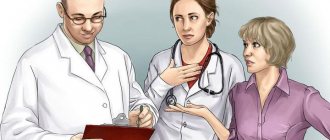
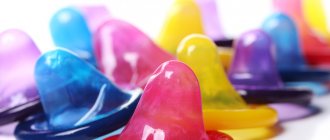


![Table 2. Hemodynamic definition of PH (adapted from [2] with modifications)](https://ms-pi.ru/wp-content/uploads/tablica-2-gemodinamicheskoe-opredelenie-lg-adaptirovano-iz-2-s-izmeneniyami-330x140.jpg)
